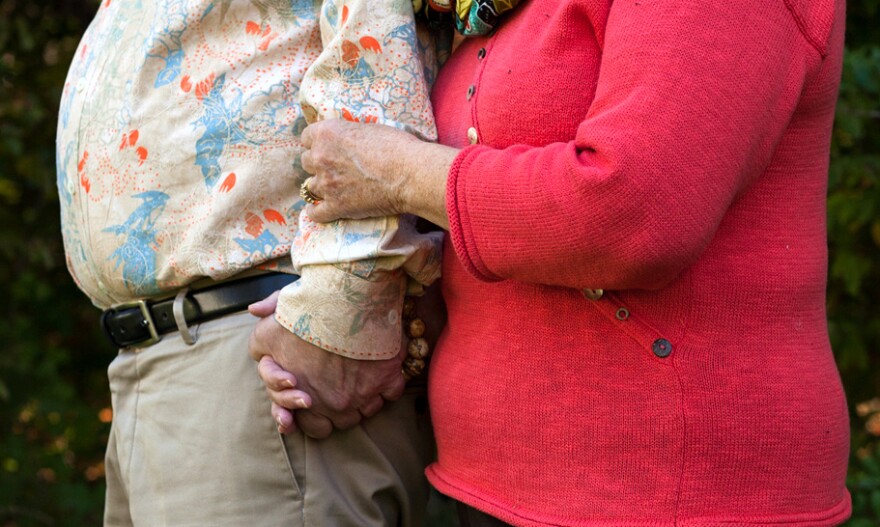A drug that's already approved for treating leukemia appears to dramatically reduce symptoms in people who have Parkinson's disease with dementia, or a related condition called Lewy body dementia.
A pilot study of 12 patients given small doses of nilotinib found that movement and mental function improved in all of the 11 people who completed the six-month trial, researchers reported Saturday at the Society for Neuroscience meeting in Chicago.
And for several patients the improvements were dramatic, says Fernando Pagan, an author of the study and director of the Movement Disorders Program at Georgetown University Medical Center. One woman regained the ability to feed herself, one man was able to stop using a walker, and three previously nonverbal patients began speaking again, Pagan says.
"After 25 years in Parkinson's disease research, this is the most excited I've ever been," Pagan says.
If the drug's effectiveness is confirmed in larger, placebo-controlled studies, nilotinib could become the first treatment to interrupt a process that kills brain cells in Parkinson's and other neurodegenerative diseases, including Alzheimer's.
One of the patients in the pilot study was Alan Hoffman, 74, who lives with his wife, Nancy, in Northern Virginia.
Hoffman was diagnosed with Parkinson's in 1997. At first, he had trouble moving his arms. Over time, walking became more difficult and his speech became slurred. And by 2007, the disease had begun to affect his thinking.
"I knew I'd dropped off in my ability to read," Hoffman says. "People would keep giving me books and I'd have read the first chapter of about 10 of them. I had no ability to focus on it."
"He had more and more difficulty making sense," Nancy Hoffman says. He also became less active, less able to have conversations, and eventually stopped doing even household chores, she says.
But after a few weeks on nilotinib, Hoffman "improved in every way," his wife says. "He began loading the dishwasher, loading the clothes in the dryer, things he had not done in a long time."
Even more surprising, Hoffman's scores on cognitive tests began to improve. At home, Nancy Hoffman says her husband was making sense again and regained his ability to focus. "He actually read the David McCullough book on the Wright brothers and started reading the paper from beginning to end," she says.
The idea of using nilotinib to treat people like Alan Hoffman came from Charbel Moussa, an assistant professor of neurology at Georgetown University and an author of the study.
Moussa knew that in people who have Parkinson's disease with dementia or a related condition called Lewy body dementia, toxic proteins build up in certain brain cells, eventually killing them. Moussa thought nilotinib might be able to reverse this process.
His reasoning was that nilotinib activates a system in cells that works like a garbage disposal — it clears out unwanted proteins. Also, Moussa had shown that while cancer cells tend to die when exposed to nilotinib, brain cells actually become healthier.
So Moussa had his lab try the drug on brain cells in a petri dish. "And we found that, surprisingly, with a very little amount of the drug we can clear all these proteins that are supposed to be neurotoxic," he says.
Next, Moussa had his team give the drug to transgenic mice that were almost completely paralyzed from Parkinson's disease. The treatment "rescued" the animals, he says, allowing them to move almost as well as healthy mice.
Moussa's mice got the attention of Pagan from Georgetown's Movement Disorders Program. "When Dr. Moussa showed them to me," Pagan says, "it looked like, hey, this is type of drug that we've been looking for because it goes to the root of the problem."
The pilot study was designed to determine whether nilotinib was safe for Parkinson's patients and to determine how much drug from the capsules they were taking was reaching their brains. "But we also saw efficacy, which is really unheard of in a safety study," Pagan says.
The study found that levels of toxic proteins in blood and spinal fluid decreased once patients began taking nilotinib. Also, tests showed that the symptoms of Parkinson's including tremor and "freezing" decreased. And during the study patients were able to use lower doses of Parkinson's drugs, suggesting that the brain cells that produce dopamine were working better.
But there are some caveats, Pagan says. For one thing, the study was small, not designed to measure effectiveness, and included no patients taking a placebo.
Also, nilotinib is very expensive. The cost of providing it to leukemia patients is thousands of dollars a month.

And finally, Parkinson's and dementia patients would have to keep taking nilotinib indefinitely or their symptoms would continue to get worse.
Alan Hoffman was OK for about three weeks after the study ended and he stopped taking the drug. Since then, "There's (been) a pretty big change," his wife says. "He does have more problems with his speech, and he has more problems with cognition and more problems with mobility."
The Hoffmans hope to get more nilotinib from the drug's maker, Novartis, through a special program for people who improve during experiments like this one.
Meanwhile, the Georgetown team plans to try nilotinib in patients with another brain disease that involves toxic proteins: Alzheimer's.
Copyright 2021 NPR. To see more, visit https://www.npr.org.


